




 After more than one and a half years of discussions with the FT-CI, RIO is joining as sympathizing sections in Germany and the Czech Republic La Verdad Obrera (newspaper of the PTS, Argentinean section of the FT-CI), interviewed Wladek Flakin and Stefan Schneider about this advance in the relationship to the FT. »»»»
After more than one and a half years of discussions with the FT-CI, RIO is joining as sympathizing sections in Germany and the Czech Republic La Verdad Obrera (newspaper of the PTS, Argentinean section of the FT-CI), interviewed Wladek Flakin and Stefan Schneider about this advance in the relationship to the FT. »»»»
 read comments (0)
read comments (0)
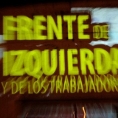 Christian Castillo, a leading member of the PTS and Vice-presidential candidate for the Workers Left Front, stated that “in the context of a conservative election, where the working population has chosen to back the government as a lesser evil to the bosses’ opposition candidates, we received massive support from workers and young people in these primary elections. The projection made by the official electoral authorities shows that we will surpass 500,000 votes. We have achieved a big increase, compared to the total of 200,000 votes received by the component parts of the Front in the 2007 Presidential elections, and the 400,000 received in 2009. We know that a large number of our supporters agreed with our condemnation of the new electoral law approved by the Kirchnerites and Radicals which bans small parties from taking part in elections if they do not obtain at least 1.5% of the vote in the primaries. We will continue fighting for the repeal of this law, which has already led to the Proyecto Sur being unable to stand in the October elections. »»»»
Christian Castillo, a leading member of the PTS and Vice-presidential candidate for the Workers Left Front, stated that “in the context of a conservative election, where the working population has chosen to back the government as a lesser evil to the bosses’ opposition candidates, we received massive support from workers and young people in these primary elections. The projection made by the official electoral authorities shows that we will surpass 500,000 votes. We have achieved a big increase, compared to the total of 200,000 votes received by the component parts of the Front in the 2007 Presidential elections, and the 400,000 received in 2009. We know that a large number of our supporters agreed with our condemnation of the new electoral law approved by the Kirchnerites and Radicals which bans small parties from taking part in elections if they do not obtain at least 1.5% of the vote in the primaries. We will continue fighting for the repeal of this law, which has already led to the Proyecto Sur being unable to stand in the October elections. »»»»

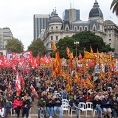 Impressions from the electoral campaign of the „Frente de Izquierda y de los Trabajadores“ („Left and Workers’ Front“, FIT) and the participation of the PTS
Impressions from the electoral campaign of the „Frente de Izquierda y de los Trabajadores“ („Left and Workers’ Front“, FIT) and the participation of the PTS
On June 12th, Alejandro López, worker in Zanón and leader of the Ceramic Workers’ Union in Neuquén („Sindicato de Obreros y Empleados Ceramistas en Neuquén“, SOECN), won a seat in the provincial parliament of Neuquén in the first provincial elections in which the FIT presented itself as an electoral front. This victory is an important step in the FIT’s electoral campaign and can serve as a first example of a revolutionary electoral campaign as well as of what to do with a seat in the parliament from a Marxist point of view. In this sense, I would like to write down some impressions of the work of the FIT so far, and especially of the PTS within this front. »»»»

 The joint RIO and FT-CI Summer Academy (August 9-14) is a high-quality summer school for revolutionaries of all ages. »»»»
The joint RIO and FT-CI Summer Academy (August 9-14) is a high-quality summer school for revolutionaries of all ages. »»»»

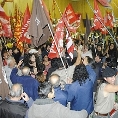 Election of a Workers’ Left Front candidate in Neuquén welcomed by workers and left activists all over the country
Election of a Workers’ Left Front candidate in Neuquén welcomed by workers and left activists all over the country
Christian Castillo, national leader of the Partido de los Trabajadores Socialistas (“Socialist Workers’ Party, PTS), who shares the presidential ticket of the Workers’ Left Front with Jorge Altamira (PO, “Workers’ Party”), greeted the political achievement in Neuquén where the Front won a provincial representative. »»»»

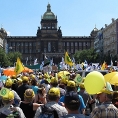 Nearly 50,000 people protested in the trade union demonstration against government reforms
Nearly 50,000 people protested in the trade union demonstration against government reforms
On Saturday, May 21th, Prague hosted a big trade union demonstration against the forthcoming reforms of the current neo-liberal right-wing coalition. The various government proposals would come to the Parliament in June, so that in most cases they could be implemented in 2012. That is why the end of May was an ideal time to show the government that its proposals will encounter a strong resistance. »»»»

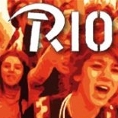 A short report from discussions and decisions at and after the first international conference of the Revolutionary Internationalist Organization
A short report from discussions and decisions at and after the first international conference of the Revolutionary Internationalist Organization
In the last six months, the Revolutionary Internationalist Organization has carried out a number of strategic discussions that led us to reconsider some of our positions. We would like to report from these discussions and briefly explain our new positions. »»»»
Theses on the Rise, Crisis and Fall of the Fourth International
Other Languages:

 We, the Revolutionary Internationalist Organization (RIO), have studied the development of the Fourth International from its founding in 1938 until the first split in 1953. We were not interested in this topic for historical reasons, but rather to draw political conclusions for building a revolutionary workers’ International today. In the last 60 years, international Trotskyism has fragmented into dozens of tendencies, and the present document does not provide an analysis of this development. However, it does provide a basis for a concrete investigation of these different tendencies. »»»»
We, the Revolutionary Internationalist Organization (RIO), have studied the development of the Fourth International from its founding in 1938 until the first split in 1953. We were not interested in this topic for historical reasons, but rather to draw political conclusions for building a revolutionary workers’ International today. In the last 60 years, international Trotskyism has fragmented into dozens of tendencies, and the present document does not provide an analysis of this development. However, it does provide a basis for a concrete investigation of these different tendencies. »»»»

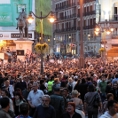 For a week now, the main squares of the cities of the Spanish state have been the focus of the whole world’s attention, especially for militant workers and young people, who have attentively followed how, in one of the countries of Europe most battered by the capitalist crisis, a broad youth movement was triggered against the dark perspectives of the future to which the bosses, the bankers and the politicians who serve them are sentencing us. The dozens of gatherings and camps throughout the world have been good evidence of that. »»»»
For a week now, the main squares of the cities of the Spanish state have been the focus of the whole world’s attention, especially for militant workers and young people, who have attentively followed how, in one of the countries of Europe most battered by the capitalist crisis, a broad youth movement was triggered against the dark perspectives of the future to which the bosses, the bankers and the politicians who serve them are sentencing us. The dozens of gatherings and camps throughout the world have been good evidence of that. »»»»

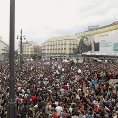 At the important assemblies taking place in the main cities in Spain there are growing concerns among the youth as to how to continue the struggle. The weight of some anarchist and autonomist currents makes it difficult to develop this discussion in clearer and more productive way. Basing themselves on the rejection of the main political parties and the trade union bureaucracy by the protestors, these currents encourage the rejection of all workers’ organisations and political groups. By doing so, they deny the right of the different political tendencies to campaign for their policies among the demonstrators, many of whom are already members of these groups. This also affects non-aligned activists who are prevented from grouping themselves with those who share similar views and who would like to defend and fight for their positions. The denial of the democratic right of expression to those organisations which support the struggle represents a step back for the development of the movement as a whole. »»»»
At the important assemblies taking place in the main cities in Spain there are growing concerns among the youth as to how to continue the struggle. The weight of some anarchist and autonomist currents makes it difficult to develop this discussion in clearer and more productive way. Basing themselves on the rejection of the main political parties and the trade union bureaucracy by the protestors, these currents encourage the rejection of all workers’ organisations and political groups. By doing so, they deny the right of the different political tendencies to campaign for their policies among the demonstrators, many of whom are already members of these groups. This also affects non-aligned activists who are prevented from grouping themselves with those who share similar views and who would like to defend and fight for their positions. The denial of the democratic right of expression to those organisations which support the struggle represents a step back for the development of the movement as a whole. »»»»

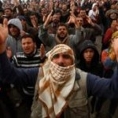 I. Capitalism in the phase of imperialism
I. Capitalism in the phase of imperialism
Since its inception, capitalism has spread around the world and has now penetrated into every corner of the earth used by people. This spreading did not always take place in the same way, but was itself subject to change. Initially, technological progress and with it the new industrially-dominated economic system were “exported” into ever more countries which could then develop into industrialized nations. The most advanced states were able to become great powers that over time gradually divided the entire globe amongst their colonial empires. »»»»

